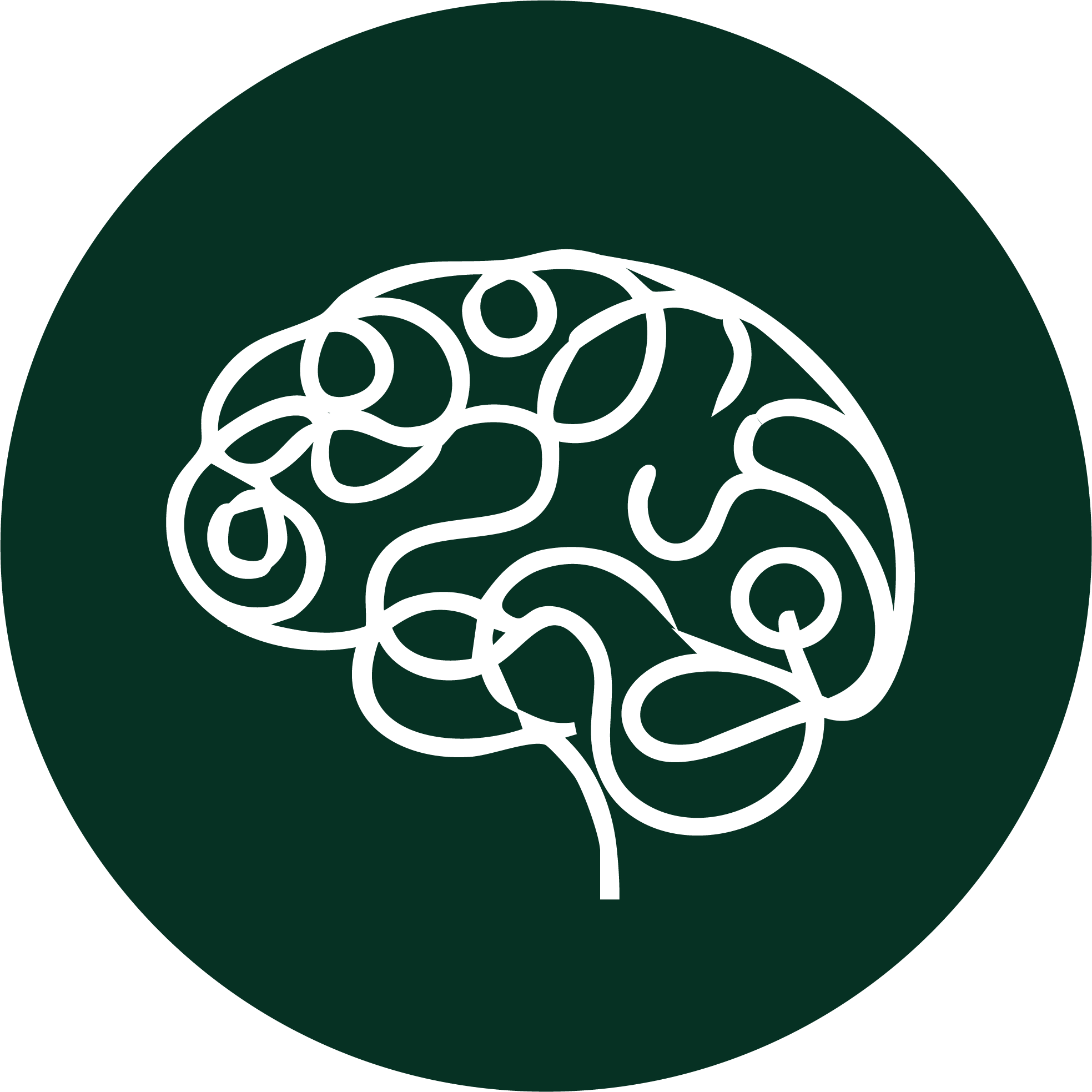Therapy Sessions in Port Coquitlam
Therapy for Anxiety
A CLINICAL DEFINITION
What is Anxiety?
Anxiety is more than just feeling stressed or worried. It’s a natural response to perceived threats, but for some, it becomes overwhelming and persistent. Clinically, anxiety is characterized by excessive fear or worry that interferes with daily life. It can manifest as generalized anxiety disorder (GAD), panic disorder, social anxiety, or specific phobias.
Symptoms of Anxiety
Physical
Rapid heartbeat, sweating, trembling, fatigue, or stomach issues.
Emotional
Constant worry, fear, irritability, or feeling on edge.
Behavioural
Avoiding situations, difficulty concentrating, or restlessness.
Cognitive
Persistent worrying, difficulty concentrating or a mind going blank, and anticipating worst-case scenarios

How Anxiety Can Show Up In Your Life
Anxiety doesn’t just stay in your mind—it spills into every part of your life. It might show up as:
Difficulty focusing at work, leading to missed deadlines or burnout.
Avoiding social events or opportunities because of fear or self-doubt.
Struggling to sleep, leaving you exhausted and unable to perform at your best.
Feeling like you’re constantly “on edge,” even when there’s no clear reason.
Read More: 10 Effective Strategies to Manage Stress and Anxiety
Living with anxiety can feel like carrying a heavy weight every day. But you don’t have to do it alone. At Serenity Counselling, we help you understand your anxiety, develop coping strategies, and reclaim your life.
Are You Ready to Move Past These Symptoms?
Why “Just Relax” Doesn’t Work (And What Does)
If you’ve been told to “breathe” or “think positive,” you know how dismissive that feels. Anxiety isn’t a choice, but with the right tools, you can rewire your response to it.
How Anxiety Counselling Helps
Unmask Triggers
We’ll explore the roots of your anxiety – past experiences, unhelpful thought patterns, or unmet needs – so you can respond, not react
Calm Your Body
Learn grounding techniques that actually work when you’re mid-panic, like sensory tools or breathwork tailored to your unique symptoms.
Rewrite the Script
Challenge the “what ifs” and catastrophic stories your anxiety tells you. What if you could handle uncertainty?
Take your Life Back
Gradually face avoided situations (social events, driving, etc.) at your own pace, rebuilding confidence.
Read More: I’m Anxious, Can EMDR Help?
What Anxiety Really Feels Like (Beyond the Textbook)
Clinically, anxiety disorders like generalized anxiety (GAD), panic attacks, or social anxiety involve intense fear that disrupts work, relationships, and your sense of self. But let’s get real: anxiety isn’t just a checklist of symptoms. It’s…
Body Betrayal
Your heart races while you’re grocery shopping. Your hands shake during a work meeting. Stomachaches hit before school drop-off. It feels like your body’s sounding alarms for threats that don’t exist.
Mental Exhaustion
Your brain replays worst-case scenarios like a broken record. “Did I send that email correctly? What if my friend is mad at me? What if I fail?” It’s exhausting trying to outthink danger constantly.
Life Shrinking
You cancel plans, avoid promotions, or skip family gatherings because “What if I panic?” Anxiety steals moments and opportunities, leaving guilt or loneliness in its wake.
You Don’t Have to “Just Live With It”
Anxiety might feel permanent, but it’s not. Imagine: Sleeping through the night without the mental chatter. Walking into a room without scanning for exits. Feeling excited about opportunities instead of terrified.
This isn’t about becoming “fearless” – it’s about building resilience so anxiety no longer calls the shots.

LOOKING FOR MORE ANSWERS?
Frequently Asked Questions
-
Anxiety is more than stress; it’s a mental health condition involving persistent fear that affects your body, thoughts, and daily life. It can show up as racing thoughts, panic, tension, or avoidance, often rooted in deeper emotional or cultural pressures. Learn more in our blog on conquering anxiety with therapy or more about Trauma Counselling in Port Coquitlam.
-
You can tell if your anxiety is "normal" or if you need help by looking at how it affects your daily life. Normal anxiety comes and goes with specific situations, like before a big test. But if you need help with anxiety, it's usually because it's showing up every day, making you avoid things you used to enjoy, or if your body feels constantly "on alert." When anxiety starts controlling your choices instead of just being a temporary feeling, that's when anxiety therapy can really help.
-
The difference between feeling anxious and having an anxiety disorder is all about how much it takes over your life. Everyone feels anxious sometimes - that's totally normal! But having an anxiety disorder means those worried feelings stick around even when there's no real danger, and they start messing with your daily life. If you're wondering about the difference, ask yourself: are you skipping school, avoiding friends, or does your body feel like it's in panic mode most days? That's when feeling anxious has crossed into anxiety disorder territory.
-
What you should expect in your first anxiety therapy session is a relaxed conversation focused on understanding you and your anxiety. Your first session is all about getting to know you and understanding how anxiety shows up in your life. We'll talk about what's been happening, when you feel most anxious, and what you're hoping to change. Don't worry about what to expect in your first anxiety therapy session , you won't have to dive into anything scary right away. It's more like having a conversation with someone who really wants to get to know you.
-
Yes, anxiety therapy can definitely help with panic attacks! Panic attacks feel terrifying, but anxiety therapy can teach you exactly what to do when one hits. You'll learn grounding techniques that actually work (not just "breathe deeply") and understand why panic attacks happen in the first place. Once you know how to handle them through anxiety therapy, panic attacks lose a lot of their power over you.
-
If you're too anxious to even start therapy, you're definitely not alone, feeling anxious about anxiety therapy is super common and makes total sense! When you're already feeling overwhelmed, starting therapy can seem scary. But here's the thing about being too anxious to start therapy: we completely get it and start slow, letting you go at your own pace. You're in control of what we talk about and when. Many people find that just taking that first step of booking a session actually helps their anxiety a little bit.
-
Yes, it's totally normal for anxiety to make you feel sick or tired all the time. When people ask "is it normal for anxiety to make me feel sick," the answer is absolutely yes. Anxiety doesn't just mess with your thoughts, it affects your whole body. When you're anxious, your body thinks it's in danger, so it pumps out stress hormones that can make you feel nauseous, exhausted, or like your heart is racing. In anxiety therapy, you'll learn why this happens and how to help your body feel safer and calmer.
-
Yes, EMDR can definitely help with anxiety. When people ask "what is EMDR," I explain it as a type of therapy that helps your brain process stuck memories or experiences that might be feeding your anxiety. EMDR for anxiety works by using eye movements (or other bilateral stimulation) while you think about what's bothering you. It sounds weird, but it's like helping your brain "digest" experiences that are keeping you anxious. Many people find EMDR helps their anxiety faster than traditional talk therapy alone.
-
EMDR for anxiety doesn't hurt, it's actually designed to make difficult feelings more manageable, not worse. When people worry "does EMDR feel scary," I understand that concern because anxiety already makes everything feel scary. During EMDR sessions, you stay in control the whole time. We go at your pace, and if anything feels too intense, we can slow down or stop. Most people find EMDR for anxiety feels more like watching a movie of their memories rather than reliving them - it creates distance so things feel less overwhelming.
-
Finding the right therapist means looking for someone who specializes in culturally responsive care and has experience supporting clients through anxiety. Therapists like Zahra Lakhdhir and Suki O’Huallachain offer tailored counselling services that honour the lived experiences of BIPOC women, providing a safe and empathetic space for healing and growth.
Book a free 20-minute consultation to get started.
“Together, we unravel the mysteries of life using curiosity as our guiding light .”





